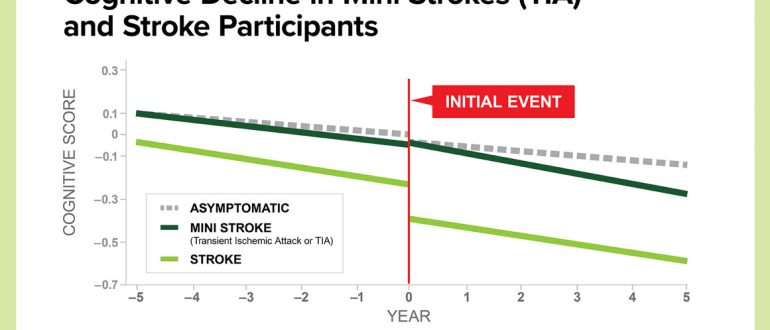This is quite an alarming finding; for the first time, the cognitive decline rate after a mini stroke has been found to be the same as a full stroke.
Mini strokes, as you know, are events during which a brain region is temporarily deprived of oxygen, most often for only few minutes, and are without a lesion on brain MRI scans.
Researchers at the University of Alabama at Birmingham evaluated TIAs’ effect on cognitive function and found a correlation between TIAs and future cognitive decline. While TIA participants were less impaired than stroke participants, results showed the two groups have the same rate of cognitive decline after their cerebrovascular event. Results have just been published in JAMA Neurology.
Mini strokes are often viewed as relatively benign cognitive events that have minimal impact on long-term health besides an increased risk of a full stroke, This study suggests that TIAs are important medical events that affect long-term cognitive outcomes.
Previous research showed reduced cognitive function following a TIA. However, the studies did not have measurements of cognition before the TIA, and additional vascular risk factors were not adjusted or excluded. In the absence of the pre-TIA cognitive baseline, this created uncertainty about whether cognitive decline after the TIA was related to the actual TIA event.
“Clinically, TIA patients should be carefully evaluated for physical and cognitive changes at the time of the event and evaluated over time for potential cognitive decline,” Del Bene said. “Future research should also focus on the mechanisms by which a TIA and causes cognitive decline. Ultimately, it could broaden how we define stroke, which would change established clinical and research guidelines.”
Hence the real importance of knowing the signs of strokes and TIA, such as FAST. As soon as symptoms appear, even if temporary, call the emergency service. A TIA is often associated with a larger stroke within 30 days, especially the first 72 hours. Earlier intervention improves the likelihood of preserving brain function and reducing long-term disability.






One Comment
The FAST acronym for stroke symptoms was mentioned; I am one of the people who think this should be replaced by BE-FAST. I had memorised FAST because strokes run in my family, but the ONLY symptom of stroke I experienced was falling over. If B for balance had been first in the acronym I’d have sought help much sooner than I did.